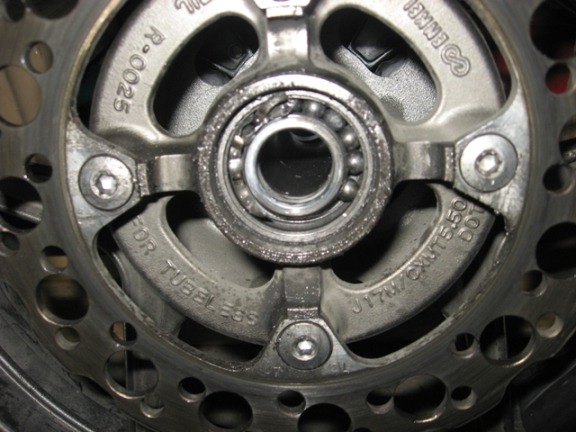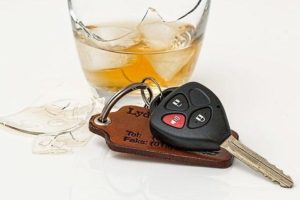Motorcycle wheel bearings are often neglected by bikers. They think little of them until they go bad. Bad bearings can result in a major crash or damaged bike parts. Check your owner’s manual for full details on how to care for your wheel bearings and how often they should be inspected.
Wheel bearings on most motorcycles have seals that prevent you from adding grease. These wheel bearings can potentially last the lifetime of the bike, if treated well. But if you ride your bike through water or mud regularly, or frequently perform jumps, wheelies, or just ride in rough terrain, you could be damaging your wheel bearings. If your bike is older and you fail to regularly lubricate the wheel bearings, you could also be damaging them. Refer to the manufacturer’s guidelines and inspect the wheel bearings regularly to check for excess wear or looseness.
Check out your wheel bearings during each tire change. When the bike is supported on a motorcycle jack, turn the tire and try to get the wheel to move, feeling for slack and give in the bearings. If it’s loose, you need to inspect the wheel bearings further. With the wheel off, insert a finger in the axle hole and attempt to turn the bearing. If it feels rough of starts to stick, it needs to be replaced. Check for metal dust or shavings around the bearings.
Signs of Bad Wheel Bearings
For a free legal consultation,
call 1-800-668-6729
Bad wheel bearings can present as a humming or rumbling feeling or a gritty vibration through the handlebars. As the problem progresses, this can even turn into a sound that you can hear when you are riding. Keep in mind, however, that your bike may have bad wheel bearings and never present with a symptom until the failure leads to a crash. Even if you avoid a crash, it can damage your wheel hubs, axles, and more. If you feel any new whirring, rumbling, or vibration, be sure to check your wheel bearings right away. Do not take chances when it comes to this repair as the damage done to your bike if your wheel bearings go can be severe.
Replacing Wheel Bearings
If you need to replace your wheel bearings, keep in mind it’s a relatively easy job. The entire process can be completed in an hour or two. If you want, you can choose to take it to your local motorcycle repair shop for service, or you can follow one of the available online tutorials. If you choose to follow the step-by-step directions online, be sure to take pictures throughout the process with your cell phone. This will when you when you work in reverse to put the bike back together again. Remember- extra parts at the end are NOT a sign that you built it better! If you DO choose to replace your bearings yourself, consider making a motorcycle wheel bearing puller. This site gives you full details on how to make a motorcycle wheel bearing puller for just two dollars!
Click to contact our personal injury lawyers today
Replacing wheel bearings can cost around $400, so this is a repair you should avoid if you can. Remember that you can often avoid having to replace your wheel bearings completely if you keep your bike clean and dry and do not ride it too aggressively. Of course, once you have detected that they are damaged, there is nothing you can do to fix the situation and they should be replaced as soon as possible.
Complete a Free Case Evaluation form now
Keeping your bike in good condition is part of being a responsible biker. When your bike is in poor condition, it can lead to a crash. Sometimes these crashes are due to maintenance issues that were ignored or not repaired properly. Other times it is the fault of the manufacturer. More and more manufacturer recalls occur each year, and sometimes these problems can result in crashes. If you have been involved in a motorcycle crash and believe it is due to a defective part, contact an experienced motorcycle attorney at 1-800-MOTORCYCLE for more information. The team at Kass & Moses can carefully assess your situation and help determine if you have a case. You may be entitled to receive compensation and damages for your injury. Contact 1-800-MOTORCYCLE today with any questions you may have!
Call or text 1-800-668-6729 or complete a Free Case Evaluation form


